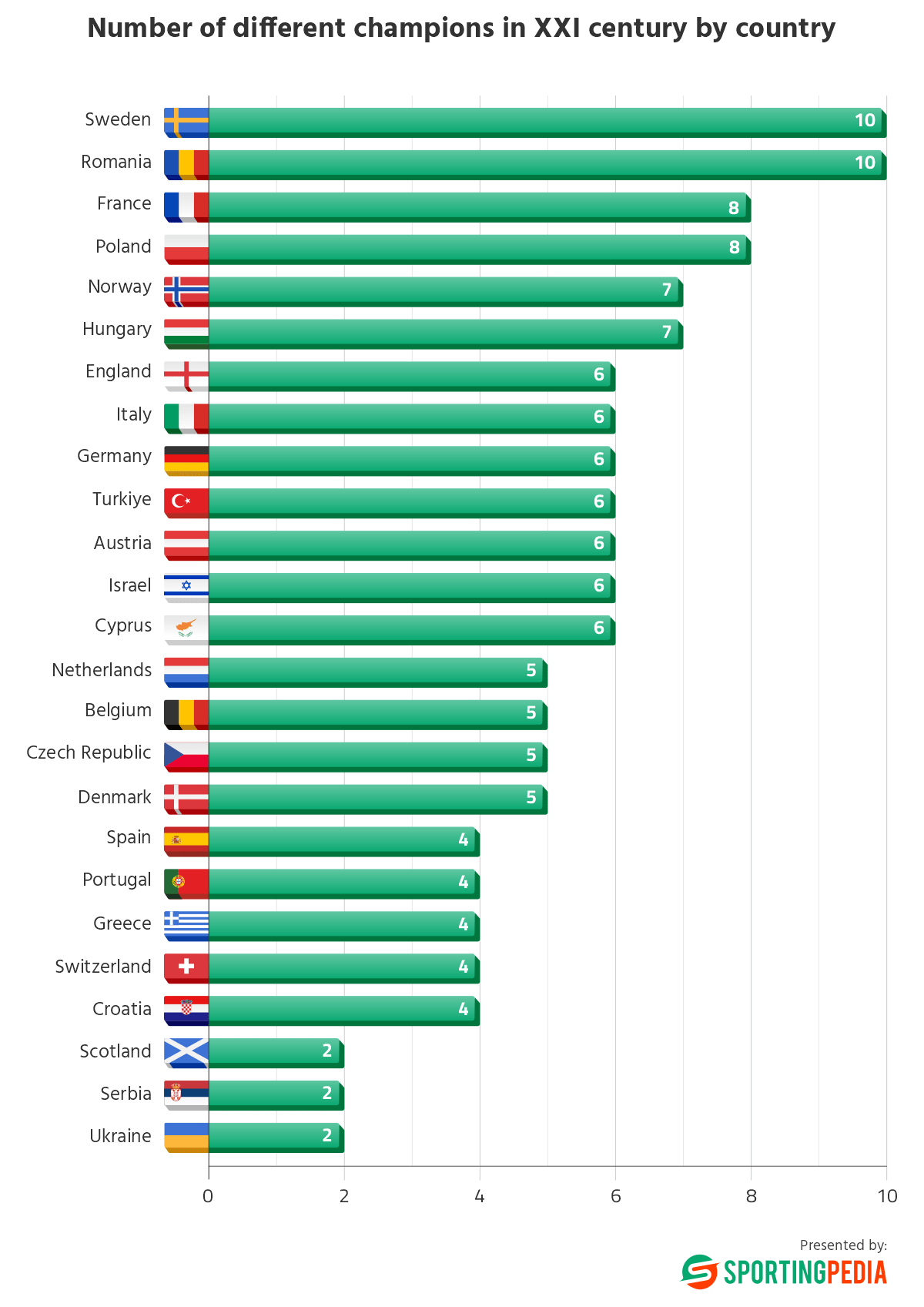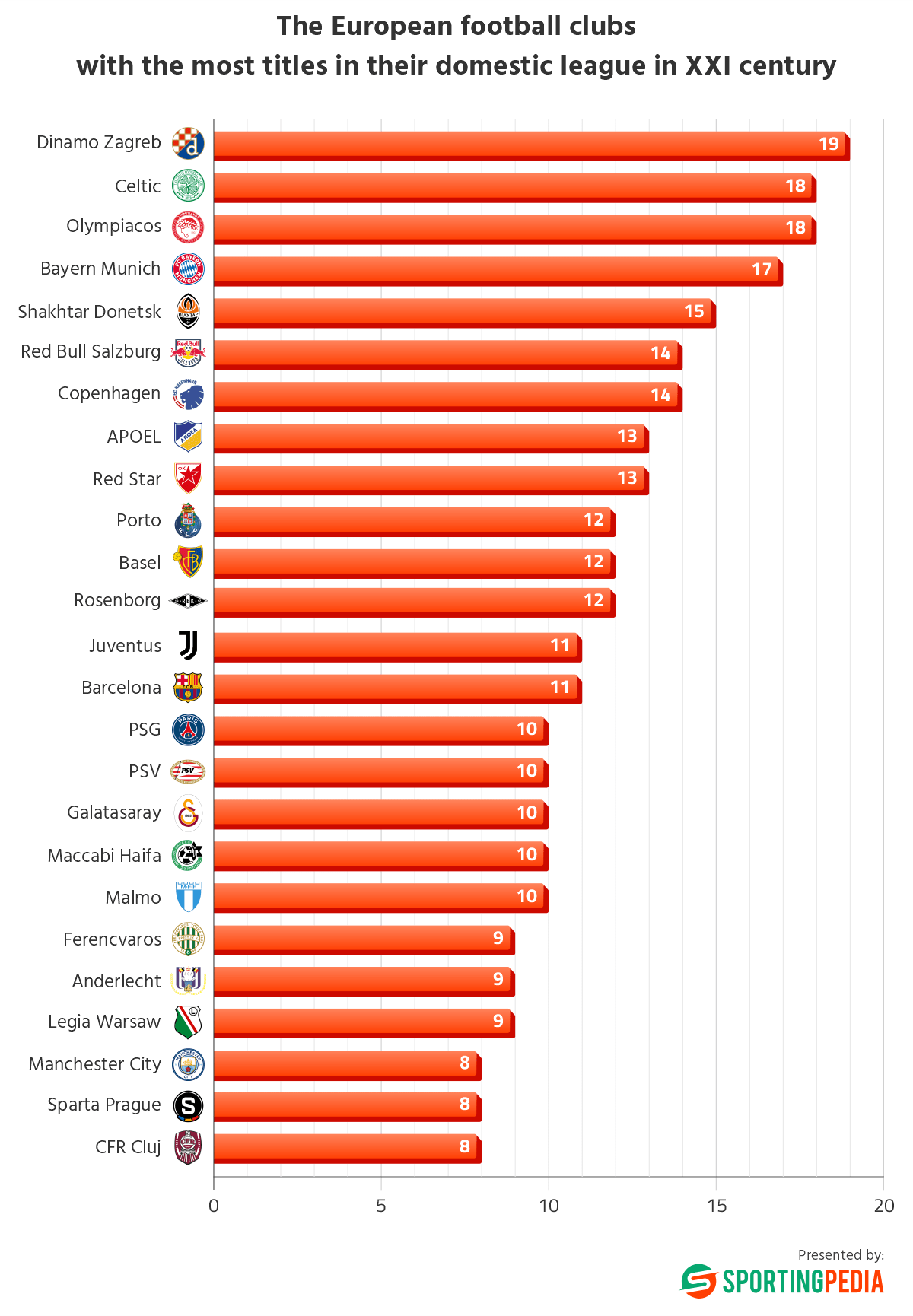Real Madrid are the undisputed kings of Europe, having won 15 Champions League titles in total and 7 since the turn of the XXI century. When it comes to domestic dominance, Los Blancos are not the same force in Spain. Instead, their fierce rivals Barcelona have excelled on the domestic front. The situation is pretty much the same in England, where Liverpool are on the verge of achieving only their second Premier League title since 2001, despite reaching the Champions League final five times and winning two trophies in the same period. All that inspired Sportingpedia to investigate which teams dominate the European leagues in the XXI century. We also look at the number of different clubs who have achieved domestic glory in the separate leagues, as some leagues have seen incredible diversity in champions while others have remained monopolised by one or two clubs.
One of the report’s most intriguing revelations is that Dinamo Zagreb, Celtic, and Olympiacos have been the most dominant European clubs in the XXI century, winning 19 and 18 domestic titles respectively. Another curious finding is that while the leagues in Sweden and Romania stand out for their unpredictability, each producing ten different title-winning teams since 2001, in stark contrast, Scotland, Serbia, and Ukraine have only had two clubs share all league titles in that same period.
- Dinamo Zagreb (19), Celtic (18), and Olympiacos (18) have won the most domestic titles in Europe since the turn of the century
- Bayern Munich leads all teams from Europe’s top 5 leagues with 17 Bundesliga titles
- Among Europe’s top 5 leagues, La Liga has seen the lowest number of different champions in the 21st century – just 4
- The French Ligue 1 has witnessed the greatest variety among the elite leagues, with 8 different champions since 2001
- Only two clubs have lifted the trophy in Scotland, Serbia, and Ukraine since the turn of the century
- Sweden and Romania top the diversity chart with 10 different title-winning clubs over the past 24 seasons
Key Takeaways:


Across Europe, domestic football competitions have followed strikingly varied paths in the 21st century. While some nations enjoy competitive parity with a broad spread of champions, others remain locked in the grip of one or two dominant clubs.
At the extreme end of consolidation are Scotland, Serbia, and Ukraine, each with just two unique champions since 2001. Scotland’s Premiership has been a Celtic-Rangers duopoly, with Celtic amassing 18 titles, and Rangers securing 6, including their 2021 unbeaten season that snapped Celtic’s streak. Serbia’s SuperLiga mirrors this, as Red Star Belgrade (13 titles) and Partizan Belgrade (11) have claimed all 24 championships. Ukraine’s Premier League is similarly exclusive, with Shakhtar Donetsk (15 titles) and Dynamo Kyiv (8) sharing every crown.
Conversely, Sweden and Romania exemplify domestic diversity, each producing 10 different champions over the past 24 seasons. Sweden’s Allsvenskan has seen clubs like Malmo lead with 9 titles, yet teams like Djurgardens, IFK Goteborg, and Hammarby (2022) keep the league unpredictable. Romania’s top-flight boasts a similar spread, with CFR Cluj winning 8 titles, and FCSB’s recent rise (6 triumphs since 2008) and one-offs like Astra, Unirea, Farul, Rapid, Otelul reflect a fluid hierarchy.
Portugal, Greece, Switzerland, and Croatia lean toward lower diversity, each with only four unique winners since 2001. Portugal’s Primeira Liga is ruled by Porto (12 titles) and Benfica (8), with Sporting CP’s 2021 and 2022 wins and Boavista’s 2001 outlier rounding out the list. Greece’s Super League has Olympiacos (18 titles) as its titan, joined by Panathinaikos, AEK Athens, and PAOK. Switzerland’s Challenge League features Basel’s 13-title reign until 2017, with FC Zürich, Young Boys (7 since 2018), and Grasshoppers adding variety. Croatia’s HNL is anchored by Dinamo Zagreb’s 19 titles, punctuated by Hajduk Split, NK Zagreb, and Rijeka.
France leads Europe’s top five leagues for domestic diversity, with eight different Ligue 1 winners since 2001. England, Italy, and Germany each have six unique champions, while Spain’s La Liga lags with just four, highlighting a tighter grip by its elite clubs.
Ligue 1’s variety persists despite Paris Saint-Germain’s financial dominance since their 2011 Qatari takeover. PSG have claimed 10 of 13 titles from 2013 to 2025, but underdog wins like Montpellier’s 2012 stunner, Lille’s 2021 upset, and Monaco’s 2017 triumph showcase France’s competitive depth.
England’s Premier League has six different champions since 2001, with Manchester City establishing domestic supremacy under Pep Guardiola. They have won 8 titles, including the last four. This is an unprecedented feat in England, though Manchester City’s European haul remains slim with just one Champions League trophy (2023). Liverpool, by contrast, have secured only one Premier League title (2020) but outshine City in Europe with two Champions League wins (2005, 2019). Arsenal’s last domestic crown – the 2004 Invincibles season fades into history, while Manchester United, with no title since Sir Alex Ferguson’s 2013 exit, have faltered despite their earlier six-title haul. Chelsea have claimed five Premier League titles, and Leicester’s stunning 2016 triumph marks them as the sixth unique English champion in the XXI century.
Germany’s Bundesliga, also with six unique winners since 2001, has been shaped by Bayern Munich’s domestic stranglehold — 11 consecutive titles from 2013 to 2023. Bayer Leverkusen’s 2024 victory under Xabi Alonso finally broke that run, adding a fresh name alongside past champions like Borussia Dortmund, Wolsburg, Werder Bremen, and Stuttgart.
Serie A has had six different winners, showing how Italy’s top league keeps changing. Juventus dominated with nine titles in a row from 2012 to 2020, but lately, Inter (2021, 2024), AC Milan (2022), and Napoli (2023) have taken over, breaking Juve’s hold — though the league still feels ruled by a few big teams.
La Liga’s domestic scene, with only four winners since 2001, is dominated by Barcelona, who lead with 11 titles this century, eight during Lionel Messi’s era (2009–2019). Real Madrid, despite their European mastery (seven Champions League titles since 2001), have been less consistent at home, winning nine La Liga crowns and enduring a drought from 2012 to 2017. Atletico Madrid’s 2014 and 2021 triumphs under Diego Simeone punctuate the duopoly, while Valencia’s early 2000s successes (2002, 2004) remain the exception.


Across Europe, the 21st century has showcased a spectrum of domestic football dominance, with some clubs cementing near-unassailable reigns over their leagues. At the pinnacle stands Dinamo Zagreb, whose 19 Croatian HNL titles since 2001 underscore their iron grip on Croatian football. Hot on their heels, Celtic and Olympiacos have each notched 18 championships, commanding Scotland’s Premiership and Greece’s Super League with relentless authority.
Bayern Munich’s 17 Bundesliga crowns not only highlight their domestic mastery but also reinforce their stature as a European giant. In Ukraine, Shakhtar Donetsk has clinched 15 Premier League titles, while Red Bull Salzburg (14), FC Copenhagen (14), and APOEL (13) have similarly stamped their dominance over Austria, Denmark, and Cyprus. Red Star Belgrade’s 13 Serbian SuperLiga triumphs and Porto’s 12 Primeira Liga victories place them among the elite, paralleled by Basel’s dozen Swiss Challenge League successes.
Among the top five leagues, Barcelona and Juventus lead with 11 titles apiece, their reigns in La Liga and Serie A marked by sustained excellence. PSG follow closely with 10 Ligue 1 crowns, their financial might translating into a decade of French supremacy. PSV, Galatasaray, Maccabi Haifa, and Malmo also join the double-digit club, each securing 10 championships in the Netherlands, Türkiye, Israel, and Sweden respectively.
England’s Manchester City have surged to 8 Premier League titles, their recent dominance reshaping the domestic landscape. Matching that tally, Anderlecht, Legia Warsaw, and Ferencvaros have asserted control in Belgium, Poland, and Hungary with 9 titles each. Sparta Prague and CFR Cluj complete the roster, each triumphing with 8 titles in the Czech Republic and Romania.
